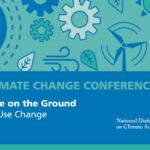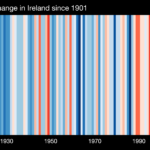Registration is now open for the EPA Climate Change Conference…
Ireland’s Climate Change Assessment published by the EPA
The evidence is clear: Climate change is happening. Immediate and sustained actions are likely to have widespread benefits.
The EPA has published Ireland’s first Climate Change Assessment. Ireland’s Climate Change Assessment (ICCA) for the first time provides a comprehensive and authoritative assessment of the state of knowledge around all key aspects of climate change, with a central focus on Ireland.
Key Messages
- Human activity has resulted in widespread and rapid changes in climate which are already impacting us all today.
- The future climate is in our collective hands. To halt warming globally and in Ireland requires rapidly reaching at least net-zero carbon dioxide emissions and substantially cutting other greenhouse gas emissions. Every action matters: with every additional increment of warming, impacts for Ireland will increase substantially.
- Having peaked in 2001, Ireland’s greenhouse gas emissions have reduced in all sectors except agriculture. However, Ireland currently emits more greenhouse gases per person than the EU average. A legal basis for deep, rapid and sustained national emissions cuts now exists, although current policy and action remain insufficient to meet these aims. The pathway forwards is clearer for energy, transport and the built environment than for agriculture and land use. For all sectors there are many challenges to overcome.
- Ireland needs to be resilient to ongoing and future climate change impacts. This requires increased focus upon and investment in adaptation that can protect us from future climatic impacts. Current implementation of adaptation is too slow and fragmented. Doing better requires financing, working with people and nature, monitoring and evaluating outcomes, and increasing public and private sector involvement.
- Effective and just transformative actions will have mitigation and adaptation benefits and bring broader benefits for health, wellbeing, nature and sustainable economic development. The state has a central role to play in enabling the necessary transformations, supported through action across society. Decisions taken this decade will reverberate for generations to come.
About Ireland’s Climate Change Assessment
The objective of Ireland’s Climate Change Assessment (ICCA) is:
- To deliver a comprehensive report on our understanding of climate change
- The option to respond to the challenges it poses
- To identify opportunities that may arise from the planned transition to a climate neutral, biodiversity-rich, environmentally sustainable and climate resilient economy and society
The report provides an assessment of our understanding of climate change, tying together all available lines of evidence to provide actionable information. This is based on scientific research and systematic observations in Ireland, linked to EU and global analysis. The ICCA aims to provide summary information that can inform decision-making on climate actions.
The ICCA report is provided in four volumes. Each volume includes a short Summary for Policymakers. Accompanying the four volumes is a Synthesis Report which integrates key findings across the underlying volumes and provides an accessible overall summary.
Foreword to Ireland’s Climate Change Assessment
This is the first Ireland’s Climate Change Assessment (ICCA) and is a major contribution to the
national dialogue and engagement on climate change. It tells us what is known about climate
change and Ireland. It also provides key insights on gaps in our knowledge. The development
of ICCA was modelled on the work of the Intergovernmental Panel on Climate Change and the
Sixth Assessment Cycle, completed in 2023, with the use of and localisation of its information for Ireland.
ICCA will support the national response to climate change, ensuring that it is informed by the
best available science. It also points to how and where that science can be improved through
further investments in innovation, in research and in systematic observations. These collectively
form the essential backbone of the science and data required to understand how Ireland is being impacted by and responding to the climate change challenge.
The full Assessment has been developed through a co-creation process between leading
academics in Ireland and officials from across state agencies and government departments.
Funding was provided by the Environmental Protection Agency, Sustainable Energy Authority of Ireland, Science Foundation Ireland and Department of Transport. The process was collaborative, involving mutual development and agreement of the scope, preparation and review of drafts, wider stakeholder consultation through a series of workshops and meetings, and a detailed sign-off process.
We see the publication of ICCA as a real innovation for Ireland and as a resource for
understanding climate change in an Irish context across the underlying science, mitigation and
adaptation measures, and opportunities. It is a starting point for further dialogue on the findings and their utility for policymakers, practitioners, researchers, research funders and people. This engagement phase should continue far beyond the publication of this Assessment and support climate action in Ireland.
Foreword by Dr Eimear Cotter – Director of the Office of Evidence and Assessment, EPA, and Chair of the ICCA Steering Committee
Learn more:
The following Summaries for Policymakers are available on www.epa.ie
- Ireland’s Climate Change Assessment Synthesis Report
- Volume 1: Climate Science – Ireland in a Changing World
- Volume 2: Achieving Climate Neutrality by 2050
- Volume 3: Being Prepared for Ireland’s Future Climate
- Volume 4: Realising the Benefits of Transition and Transformation







